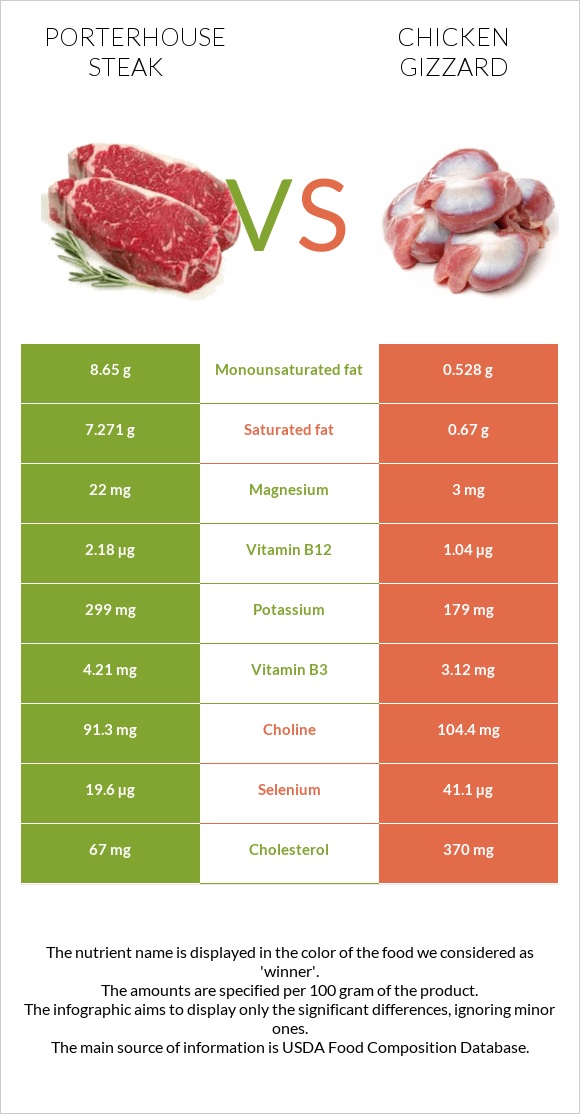Porterhouse steak vs. Chicken gizzards — In-Depth Nutrition Comparison
Compare
Summary of differences between porterhouse steak and chicken gizzards
- Porterhouse steak has more vitamin B12, vitamin B6, vitamin B3, and vitamin B1; however, chicken gizzards are higher in selenium.
- Chicken gizzards cover your daily need for cholesterol, 101% more than porterhouse steak.
- Porterhouse steak has 11 times more saturated fat than chicken gizzards. While porterhouse steak has 7.271g of saturated fat, chicken gizzards have only 0.67g.
These are the specific foods used in this comparison Beef, short loin, porterhouse steak, separable lean, and fat, trimmed to 0" fat, all grades, cooked, broiled and Chicken, gizzard, all classes, cooked, simmered.
Infographic

Infographic link
Mineral Comparison
Mineral comparison score is based on the number of minerals by which one or the other food is richer. The "coverage" charts below show how much of the daily needs can be covered by 300 grams of the food.
| Contains more MagnesiumMagnesium | +633.3% |
| Contains more PotassiumPotassium | +67% |
| Contains more CalciumCalcium | +142.9% |
| Contains more CopperCopper | +23.8% |
| Contains less SodiumSodium | -13.8% |
| Contains more ManganeseManganese | +393.3% |
| Contains more SeleniumSelenium | +109.7% |
Vitamin Comparison
Vitamin comparison score is based on the number of vitamins by which one or the other food is richer. The "coverage" charts below show how much of the daily needs can be covered by 300 grams of the food.
| Contains more Vitamin B1Vitamin B1 | +280.8% |
| Contains more Vitamin B3Vitamin B3 | +34.9% |
| Contains more Vitamin B6Vitamin B6 | +414.1% |
| Contains more Vitamin B12Vitamin B12 | +109.6% |
| Contains more FolateFolate | +40% |
| Contains more Vitamin EVitamin E | +11.1% |
| Contains more Vitamin B5Vitamin B5 | +49% |
All nutrients comparison - raw data values
| Nutrient |  |
 |
DV% diff. |
| Cholesterol | 67mg | 370mg | 101% |
| Vitamin B12 | 2.18µg | 1.04µg | 48% |
| Selenium | 19.6µg | 41.1µg | 39% |
| Saturated fat | 7.271g | 0.67g | 30% |
| Fats | 19.27g | 2.68g | 26% |
| Vitamin B6 | 0.365mg | 0.071mg | 23% |
| Monounsaturated fat | 8.65g | 0.528g | 20% |
| Protein | 23.96g | 30.39g | 13% |
| Vitamin B3 | 4.21mg | 3.12mg | 7% |
| Calories | 276kcal | 154kcal | 6% |
| Vitamin B1 | 0.099mg | 0.026mg | 6% |
| Magnesium | 22mg | 3mg | 5% |
| Potassium | 299mg | 179mg | 4% |
| Iron | 2.94mg | 3.19mg | 3% |
| Copper | 0.13mg | 0.161mg | 3% |
| Manganese | 0.015mg | 0.074mg | 3% |
| Vitamin B5 | 0.314mg | 0.468mg | 3% |
| Choline | 91.3mg | 104.4mg | 2% |
| Polyunsaturated fat | 0.69g | 0.353g | 2% |
| Calcium | 7mg | 17mg | 1% |
| Zinc | 4.56mg | 4.42mg | 1% |
| Phosphorus | 193mg | 189mg | 1% |
| Vitamin B2 | 0.228mg | 0.21mg | 1% |
| Folate | 7µg | 5µg | 1% |
| Protein per 100 calories | 8.681159420289855g | 19.733766233766232g | N/A |
| Sodium | 65mg | 56mg | 0% |
| Vitamin E | 0.18mg | 0.2mg | 0% |
| Trans fat | 0.13g | N/A | |
| Tryptophan | 0.259mg | 0% | |
| Threonine | 1.104mg | 0% | |
| Isoleucine | 1.228mg | 0% | |
| Leucine | 2.105mg | 0% | |
| Lysine | 2.233mg | 0% | |
| Methionine | 0.676mg | 0% | |
| Phenylalanine | 1.033mg | 0% | |
| Valine | 1.288mg | 0% | |
| Histidine | 0.775mg | 0% | |
| Omega-3 - ALA | 0.004g | N/A | |
| Omega-6 - Gamma-linoleic acid | 0.003g | N/A | |
| Omega-6 - Eicosadienoic acid | 0.019g | N/A |
Macronutrient Comparison
Macronutrient breakdown side-by-side comparison
Protein:
23.96 g
Fats:
19.27 g
Carbs:
0 g
Water:
54.66 g
Other:
2.11 g
Protein:
30.39 g
Fats:
2.68 g
Carbs:
0 g
Water:
67.93 g
Other:
0 g
| Contains more FatsFats | +619% |
| Contains more OtherOther | +∞% |
| Contains more ProteinProtein | +26.8% |
| Contains more WaterWater | +24.3% |
~equal in
Carbs
~0g
Fat Type Comparison
Fat type breakdown side-by-side comparison
Saturated fat:
Sat. Fat
7.271 g
Monounsaturated fat:
Mono. Fat
8.65 g
Polyunsaturated fat:
Poly. Fat
0.69 g
Saturated fat:
Sat. Fat
0.67 g
Monounsaturated fat:
Mono. Fat
0.528 g
Polyunsaturated fat:
Poly. Fat
0.353 g
| Contains more Mono. FatMonounsaturated fat | +1538.3% |
| Contains more Poly. FatPolyunsaturated fat | +95.5% |
| Contains less Sat. FatSaturated fat | -90.8% |





